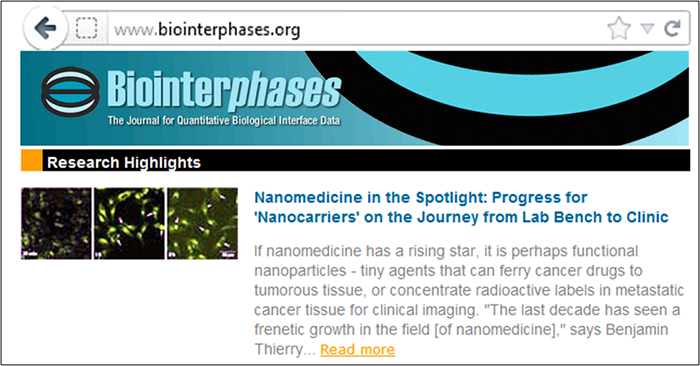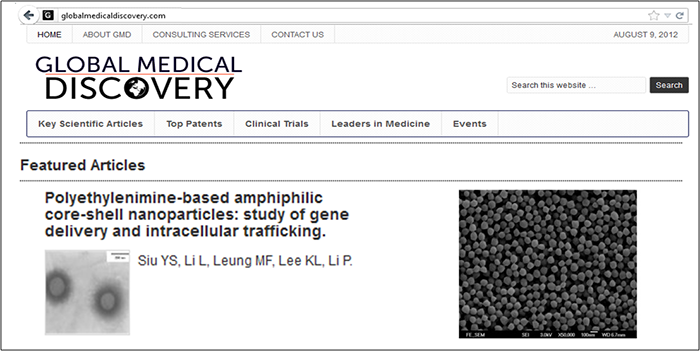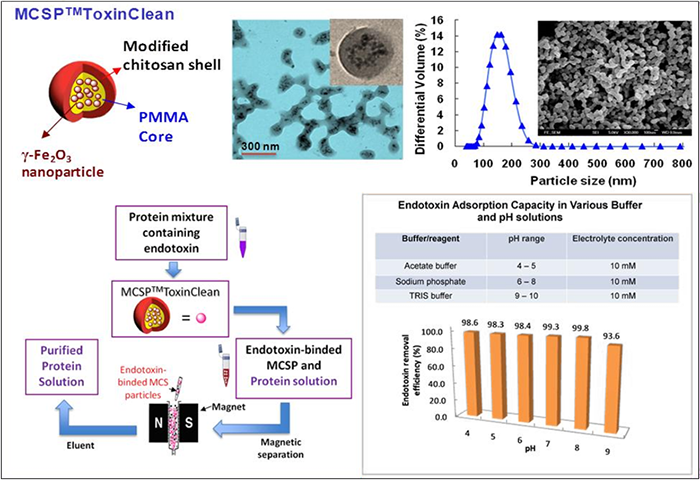- Home
- Research
- Research Centres
- Lo Ka Chung Research Centre for Natural Anti-Cancer Drug Development
- Research
- Novel Anti-Cancer Biological Drug, BCA-PEG20
Novel Anti-Cancer Biological Drug, BCA-PEG20
Principal Investigator: Prof. Li Pei, Pauline
1) Development of nanocarriers for gene and drug deliveries
We have established a core-shell particle platform technology which allows us to design and synthesize highly uniform particles in nano- to micro-scaled sizes with different physical and chemical properties. One of the research areas in our group is to develop non-viral polyethyleneimine-based nanocarriers for gene and drug deliveries. Our PEI-based amphiphilic core-shell nanoparticles show great potential to be efficient nanocarriers for deliveries of plasmid DNA and drugs. We have also synthesized a gelatin/PEI core-shell nanogel as a new type of siRNA nanocarrier. Results show that the gelatin/PEI core-shell nanogel particles can effectively deliver the siRNA molecules to the site of function and knock-down the gene of interest.
Research Highlights in Biointerphases

Featured Article in Global Medical Discovery

Selected Publications:
- Hetti Mimi, Kin Man Ho, Yuen Shan Siu, Aihua Wu and Pei Li*, “Polyethyleneimine-Based Core-Shell Nanogels: A Promising siRNA Carrier for Argininosuccinate Synthetase mRNA Knockdown in HeLa Cells”, Journal of Controlled Release, 158, 123-130 (2012)
- Yuen Shan Siu, Lijun Li, Man Fai Leung, Kam Len Daniel Lee, and Pei Li*, “Polyethyleneimine-Based Amphiphilic Core-Shell Nanoparticles: Study of Gene Delivery and Intracellular Trafficking”, Biointerphases, 7, 16 (2012).
- Pei Li*, Yuen Shan Siu, Kin Man Ho, Wei Li, “Amphiphilic Core-Shell Nanoparticles Containing Hairy Polyethyleneimine Shells as Effective Nanocarriers for Gene Delivery”, Book chapter in the “Selected Topics in Nanomedicine” published by World Scientific Publishing, (In press, 2012).
- Min Feng, Pei Li*, “Amine-containing core-shell nanoparticles as potential drug carriers for intracellular delivery”, Journal of Biomedical Materials Research, 80, 184-193 (2007).
- Junmin Zhu, Angie Tang, Lai Pang Law, Min Feng, Kin Man Ho, Daniel Kam Len Lee, Frank W. Harris, Pei Li*, “Amphiphilic Core-shell Nanoparticles with Poly(ethylenimine) Shells as Potential Gene Delivery Carriers”, Bioconjugate Chemistry, 16, 139-146 (2005).
2) Development of nanosorbents for bioseparation and purification
The technology provides a fast and simple solution for selective removal of endotoxin from protein solutions in physiological buffers. It adopts a type of magnetic core-shell (MCS) composite particles, which can selectively bind endotoxin in protein mixtures and are easily removed by a magnetic separation. The endotoxin level of the treated protein solution is low enough (< 10 EU/mL) to allow for further process, analyze or even administrate to mammals.
Our method has the following advantages:
- High selectivity for endotoxin adsorption in both basic and acidic protein mixtures (e.g. bovine serum albumin).
- Effective in broad working conditions (different pHs, electrolyte concentrations and buffer types).
- Simple process which does not require multiple extraction steps (unlike Triton X-114 extraction method).
- Low cost, avoiding the use of expensive reagent (e.g., polylysine).
- Fast purification process without common problems such as filter blocking in microfiltration and time-consuming process when using porous adsorbents.

Selected Publications:
- Kin Man Ho, Pei Li*, “Selective endotoxin nanosorbents, and a method of removing endotoxin by using amphiphilic core-shell nanosoorbents”, U.S. Patent Application (Pending, 2011).
- Kin Man Ho, Pei Li*, “Design and Synthesis of Novel Magnetic Core-Shell Polymeric Particles”, Langumir, 24, 1801-1807 (2008).



